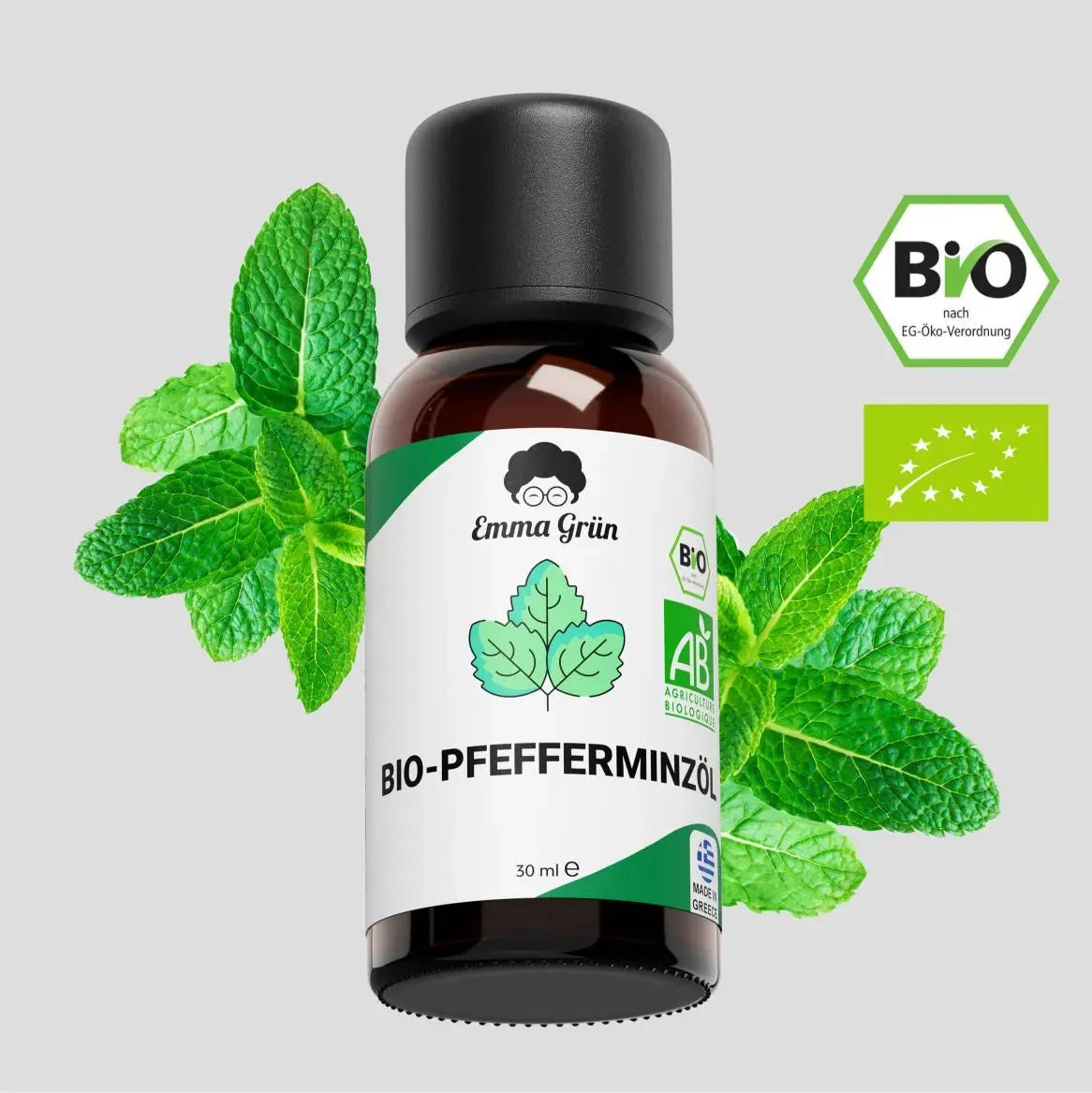Peppermint oil has a long history in traditional medicine and is still used in a variety of applications today. In the following sections, we will take a closer look at how peppermint oil is made, its uses, and its benefits. So if you want to learn more about this fascinating essential oil, just read on!
How can peppermint oil help with headaches and migraines?
Peppermint oil can be an effective and natural option to relieve tension headaches and sometimes mild migraines. The cooling and anti-inflammatory properties of peppermint oil can help reduce headaches and provide a calming effect on the head and neck area. Here are some ways mint oil can be used for headaches.
1. Peppermint oil for skin applications
To avoid possible skin irritation, always mix peppermint oil with a carrier oil such as almond or coconut oil. Gently massage the diluted solution onto the temples, forehead and neck area. The essential oil is absorbed through the skin and can exert its cooling effect on the painful areas of the body, helping to relieve tension headaches.

2. Peppermint oil in aromatherapy
You can also use peppermint oil in a scented lamp or diffuser . The pleasant scent of peppermint oil can help reduce stress and tension , which in turn can help relieve headaches. Inhale the scent slowly and deeply to enhance the relaxing effect.
3. Peppermint oil for inhalation
Another method is to inhale peppermint oil vapors. Fill a bowl with hot water and add a few drops of peppermint oil . Tilt your head over the bowl, cover your head with a towel and slowly breathe in the rising vapors. This measure is particularly effective for cold symptoms such as a blocked nose and persistent headaches. You will see: after this soothing procedure, you can finally breathe freely again.
4. Peppermint oil roller for on the go
Another option is to fill a roller with diluted peppermint oil and apply the oil to your temples, neck and forehead as needed. A roller simplifies application, is convenient for on the go and allows for targeted application of the peppermint oil.
In summary, peppermint oil is a natural and effective way to relieve headaches that may be due to tension or stress. It can be used as part of a holistic approach to pain relief that promotes calm, relaxation and potentially an improvement in headache symptoms.
Does peppermint oil help with migraines?
Studies and reports have shown that the cooling effect and anti-inflammatory properties of peppermint oil can relieve mild migraine pain . There are several ways in which peppermint oil can be used to relieve pain. These include, as with the treatment of headaches, external application and inhalation.
It is important to note that not everyone reacts to essential oils in the same way. For example , peppermint oil can also trigger or worsen headaches in some people . To rule out individual risks or interactions with other medications, it is therefore advisable to consult a doctor before use.
Important: There are also other natural approaches to relieving migraines, such as relaxation techniques, acupuncture, sufficient sleep and stress management. The use of essential oils such as peppermint oil can be a complementary measure. However, comprehensive treatment should always be carried out in consultation with a doctor, especially if the migraines occur frequently or are particularly severe.
Since when have people been using peppermint oil to relieve pain?
The use of peppermint to relieve pain goes back a long way and can be traced back to ancient times . In Greek and Roman medicine, the medicinal plant was used to treat stomach ailments, indigestion and headaches due to its calming effect on the gastrointestinal tract and its analgesic properties. Peppermint was also used in ancient Egypt to relieve pain and treat various ailments. For example, it was used in the form of ointments and balms to treat joint pain and headaches.
Over the centuries, the natural herb has been used as a medicinal remedy. Due to its proven effectiveness, this tradition has continued into the present day. In many parts of the world, peppermint oil is considered a natural method for relieving headaches, muscle pain and joint pain . The medicinal herb is also particularly valued today for the treatment of respiratory diseases.

Peppermint oil: areas of application & effects
Peppermint oil has a wide range of uses, from traditional medicine to aromatherapy . Its benefits are based on the different effects of its main components, menthol and menthone. Here are some of the main uses:
- Peppermint oil for stomach discomfort relief: Peppermint oil can help with indigestion, bloating, stomach cramps and irritable bowel syndrome. The oil relaxes the smooth muscles in the gastrointestinal tract and promotes relaxation, which can lead to relief from symptoms.
- Peppermint oil for respiratory diseases: The menthol-containing vapors of peppermint oil provide relief from colds and coughs and help with a blocked nose. Inhalations or rubbing on the chest and back can be particularly effective.
- Peppermint oil for headaches and migraines: Peppermint oil can help relieve tension headaches due to its cooling effect and may even reduce migraine symptoms in some people.
- Peppermint oil for oral and dental care: Peppermint oil ensures fresh breath. The oil also has an antibacterial effect and reduces the formation of harmful bacteria in the throat. It is therefore not surprising that it is often used in industry to make toothpastes, mouthwashes and chewing gum.
- Peppermint oil for muscle and joint pain: The cooling effect of peppermint oil can relieve muscle tension and mild joint pain. It is often used in massages or as an addition to baths.
- Peppermint oil in aromatherapy: The refreshing scent of peppermint oil can have a calming effect and help reduce stress and tension . Aroma lamps or scented candles that spread the pleasant scent throughout the room are ideal for this.
- Peppermint oil for more concentration and alertness: The invigorating effect of peppermint oil can improve concentration and mental alertness. Therefore, it is sometimes used during long periods of work or studying.
- Cooling effect of peppermint oil: Peppermint oil creates a cooling sensation on the skin, which is incredibly pleasant and refreshing, especially on hot days or after physical exertion.
Peppermint oil: What side effects can occur?
Although peppermint oil has many beneficial properties, some people may also experience side effects. Find out what these are and what you should look out for when using it:
- Skin irritation: Peppermint oil can cause skin irritation in some people. This usually only happens when it is applied undiluted to the skin. Therefore , when using it externally, you should make sure that the essential oil has been diluted with a carrier oil . We also recommend that you always carry out a skin tolerance test beforehand. To do this, drip a small amount of the diluted peppermint oil onto an inconspicuous part of your skin and wait a few hours. If you have an allergic reaction, your skin will turn red and, in the worst case, start to itch. If this happens, you should refrain from using it externally.
- Eye irritation: Peppermint oil can cause severe irritation! Therefore, direct eye contact should be avoided at all costs. If the oil accidentally gets into your eyes despite all precautions, you must rinse them immediately with clean water. If irritation does not subside, we recommend that you consult a doctor.
- Sensitivity in infants and young children: Essential oils such as peppermint oil can cause respiratory irritation in infants and young children. Therefore, it is recommended that essential oils be used on children under six years of age only under medical supervision.
- Drug interactions: Peppermint oil can interact with certain medications. If you take medication regularly, you should consult a doctor or pharmacist before using peppermint oil.
- Peppermint oil during pregnancy and breastfeeding: Pregnant women should discuss the use of peppermint oil with their doctor. Peppermint oil used in high doses can stimulate labor and may cause labor to start too early. It is therefore recommended that you exercise caution when using essential oils during pregnancy and breastfeeding.
- Stomach irritation: In some people, peppermint oil can cause heartburn or stomach irritation. Therefore, if you suffer from stomach upset or acid reflux, it is advisable to avoid using peppermint oil or talk to your doctor.
- Interaction: Because peppermint oil has a cooling effect, it can cause a temporary feeling of coldness or tingling on the skin in some people. This phenomenon occurs especially when the oil is applied over a large area or undiluted.
Good tip: It is important to stress that individual sensitivity to essential oils can vary. If you are unsure whether peppermint oil is suitable for you, you should consult a doctor, pharmacist or aromatherapy specialist before using it. Overall, however, using peppermint oil is safe. The prerequisite: it must be used correctly and responsibly.
Buying peppermint oil: What you should pay attention to
The quality of peppermint oil depends on various factors such as the type of plant, the growing conditions, the distillation method used and the storage. In order to preserve the beneficial properties of the essential oils, high-quality mint oil, such as the organic peppermint oil from Emma Grün , is mainly obtained through gentle steam distillation .

Therefore, keep your eyes open when buying and read the small print. You should pay particular attention to organic quality when inhaling or applying to the skin.
Conclusion
Peppermint oil is a versatile essential oil with a range of uses and beneficial properties. From relieving pain and inflammation to aiding digestion and expanding airways, it offers a natural alternative to many conventional medications. However, keep in mind that essential oils are highly concentrated and should always be used with caution.
FAQ: Questions & Answers
Why does peppermint oil relieve headaches?
Peppermint oil has been a tried and tested home remedy for headaches for years. This is due to the menthol it contains, which relieves head pressure due to its cooling properties.
How can peppermint oil be used for headaches?
To relieve headaches, you can put a few drops of the essential oil on your forehead or temples or on your neck and massage it in gently. Another method that is particularly beneficial for cold symptoms is adding it to steam baths.
What side effects can peppermint oil cause?
Peppermint oil can cause reflux, allergies and inflammation of the nasal mucosa in some people.
Sources
- Peppermint oil for tension headaches – https://schmerzklinik.de/pfefferminzoel-bei-spannungskopfschmerzen/
- Peppermint: Helpful for headaches and stomach aches – https://www.apotheken-umschau.de/medikamente/heilpflanzen/pfefferminze-hilfreich-gegen-kopf-und-bauchschmerzen-733337.html
- Peppermint oil – https://infothek-gesundheit.de/pfefferminzoel-wirksam-bei-spannungskopfschmerzen/



